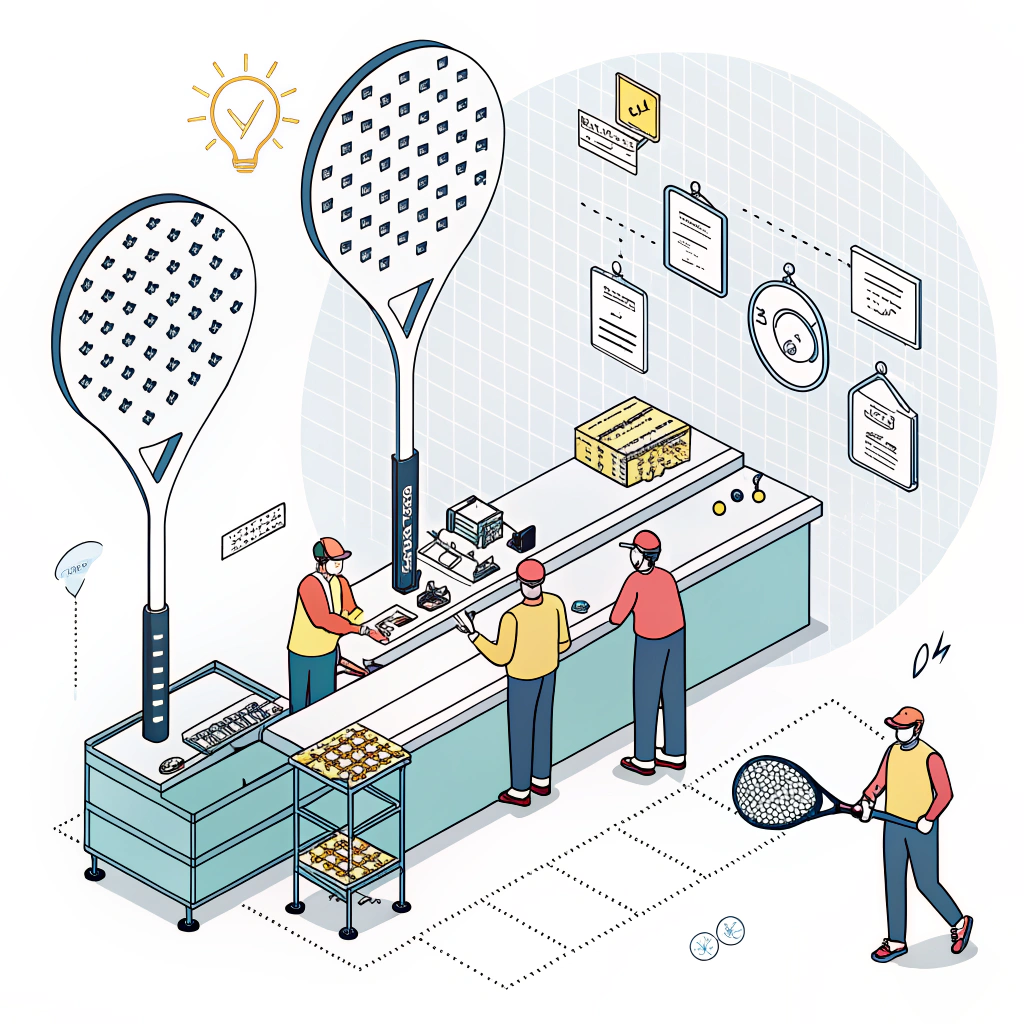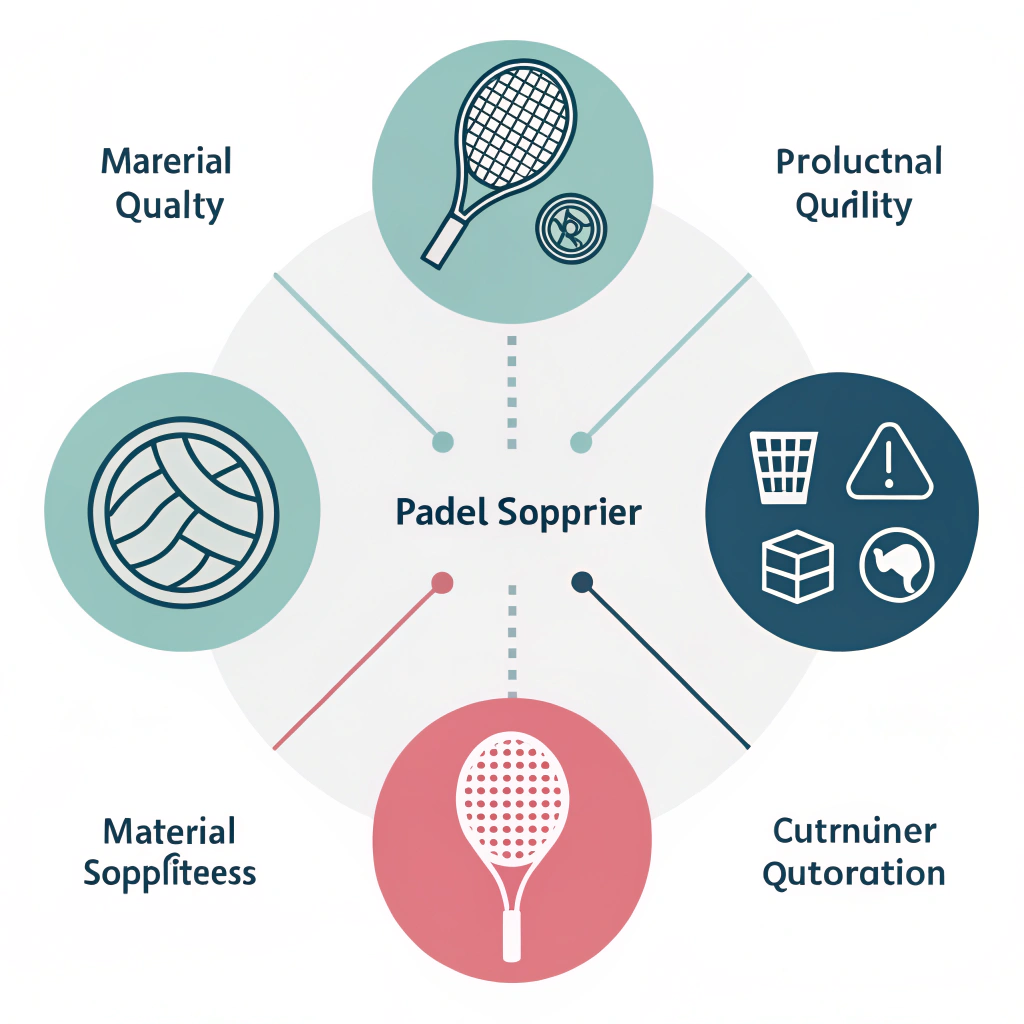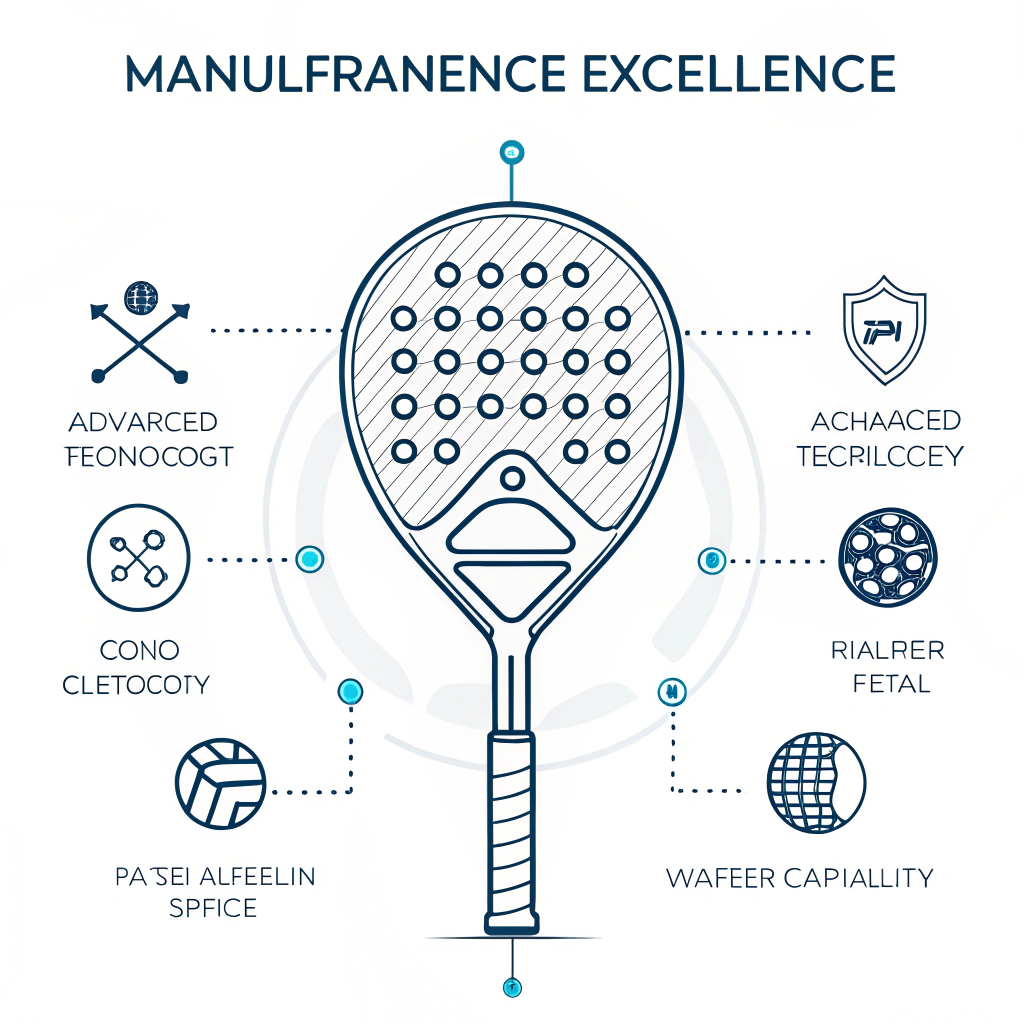Selecting the right high-performance padel racket partner starts with understanding the technical nuances and manufacturing excellence that separate industry leaders. In today’s competitive market, procurement managers must analyze material quality, production efficiency, customization capabilities, and the supplier’s overall reliability. This article provides a detailed comparison framework tailored for B2B procurement professionals looking to source premium padel rackets.
Procurement managers in the padel sports industry face a complex decision-making landscape. They need to choose suppliers who guarantee premium quality while meeting stringent technical requirements. In the case of high-performance padel rackets, several factors are critical:
• The quality of raw materials (e.g., various grades of carbon fiber1 such as 3k, 12k, 18k).
• Advanced production techniques that ensure precision and durability.
• The ability to customize products—from racket shape (Diamond, Round, Teardrop, or even bespoke forms) to branding elements like logo printing on hand grips and handle covers.
• Timely delivery and efficient production sampling as key performance benchmarks.
The challenge is not merely choosing the supplier with the best technical specifications, but rather a partner who understands innovation and manufacturing consistency across diverse production runs. Companies like NEX Padel are setting high standards by blending cutting-edge factory production methods with a solid track record among renowned brands like Hirostar, Reebok, and Starvie.
When evaluating manufacturing partners in the padel industry, focus on these technical and operational parameters:
-
Material Quality and Composition
The type of carbon fiber1 used (3k, 12k, 18k) markedly influences durability and performance. Higher modulus fibers can offer improved rigidity and longer lifespan for competitive play, while variants like glass fiber might be used in entry-level product lines. -
Precision Engineering2 and Production Techniques
Advanced production techniques, such as automated layup processes and quality control via digital measurement, need to be thoroughly evaluated. Manufacturers that implement strict quality assurance protocols provide evidence of superior performance consistency. -
Customization and Flexibility
The ability to offer full customization—from racket shapes to accessory branding—is essential. For instance, a manufacturer that supports custom printing, color variations, and even bespoke hand grip designs can help your brand stand out. -
Production Efficiency and Lead Times3
Timeliness in sampling and large-scale production is crucial. Quick prototyping and reliable delivery ensure that your business remains agile, avoiding potential supply chain disruptions. -
Industry Certifications and Reputation
Reliability is often linked to adherence to industry certifications and continuous testing methods. Partners like NEX Padel showcase certification standards that align with global benchmarks in sports equipment manufacturing.
This comparison framework serves to guide procurement professionals as they weigh multiple factors to achieve a sound and informed decision.
A significant part of the decision process involves a detailed comparison among industry players. Let’s break down how to approach this evaluation:
Not every supplier excels in every category. Decision makers typically focus on:
• Material Innovation: Does the supplier use higher-grade materials and advanced production techniques?
• Customization Potential: Can the partner cater to niche requirements such as unique shapes or branded accessories?
• Scalability: Is the supplier equipped to handle fluctuating production volumes without compromising quality?
• Market Reputation: What kind of feedback or certifications highlight the supplier’s excellence?
A quick scan may reveal clear differences: suppliers with top-tier carbon fiber options generally excel in performance, whereas those emphasizing customization might lead in brand differentiation. Evaluating these aspects side-by-side allows procurement teams to prioritize what matters most—be it ultra-high performance or creative product customization.
Consider a detailed table that includes these dimensions:
| Supplier/Brand | Material Grade Options | Customization Options | Production Lead Time | Reputation/Certifications |
|---|---|---|---|---|
| Supplier A (Example) | 3k carbon fiber only | Limited shape customizations | 6-8 weeks sampling round | Standard industry certifications |
| Supplier B (Example) | 3k, 12k carbon fibers | Fully customizable shapes and logos | 4-6 weeks prototype delivery | Accredited by international bodies |
| NEX Padel | 3k, 12k, and 18k carbon fiber alternatives | Custom shapes (Diamond, Round, Teardrop) and accessory branding | Fast sampling and on-time delivery | Trusted by global brands; ISO-certified |
This table highlights varied strengths and weaknesses. Your decision process should align with your specific business needs, whether it’s material quality, rapid production, or versatile customization.
In the dynamic sports equipment market, third-party data and customer testimonials play a crucial role. By reviewing market trends, procurement managers can gauge the broader industry movement and validate the technical claims made by suppliers. For example, advancements in precision engineering2 directly relate to enhanced play performance, a fact well documented in independent testing reports and user surveys.
At NEX Padel, we understand that B2B purchasers require a partner who demonstrates both technological innovation and operational reliability. Here’s how we meet these key criteria:
- We utilize a range of carbon fiber options, from 3k to 18k, ensuring that every product is engineered for peak performance.
- Our in-house testing and quality control protocols guarantee that each padel racket meets the highest standards of durability and performance.
- We offer a full range of customization options. Whether you need a traditional Diamond, Round, or Teardrop shape or a fully bespoke design, our engineering team is prepared to deliver products that fit your brand’s vision.
- The possibility to customize hand grips and handle covers with your company logo or specific color schemes further solidifies your brand identity in competitive tournaments.
- Our rapid sampling process ensures that you see quick prototypes, reducing the sampling cycle and speeding time-to-market.
- Our consistent on-time delivery record means your production schedules remain uninterrupted even in fluctuating market demands.
- We have been the preferred manufacturing partner for industry leaders such as Hirostar, Reebok, and Starvie. Our collaborations reflect not only quality assurance but also a shared commitment to performance and precision.
These strengths position NEX Padel as a supplier that not only meets international technical standards but also provides innovative, market-responsive solutions. Our goal is to empower distributors and procurement managers with the confidence they need to invest in high-performance padel equipment.
Before making your procurement decisions, consider these strategic insights:
-
Identify Your Core Requirements:
Align your procurement objectives with the manufacturer’s ability to deliver on precision engineering, advanced materials, and rapid customization. Quality assurance4 is non-negotiable in competitive markets. -
Evaluate Supplier Track Records:
Look deeper than technical specifications—assess the supplier’s client testimonials, reliability of delivery schedules, and after-sales support, which are essential for long-term partnerships. -
Consider Market Trends and Future-Readiness:
The padel market is evolving, with trends leaning towards lightweight materials, ergonomic designs, and more personalized sports gear. Ensure your supplier is aligned with these trends and investing in next-generation production processes. -
Establish Clear Quality Metrics:
Ensure that performance tests, material certifications, and industry benchmarks are part of your supplier evaluation. This risk management approach will safeguard against future performance inconsistencies. -
Build a Collaborative Partnership:
Effective B2B relationships are built on mutual trust and open channels of communication. A supplier willing to support continuous improvement, rapid prototyping, and agile customizations is invaluable.
By leveraging the detailed technical comparisons, understanding market-driven differences, and focusing on proven manufacturing excellence, procurement managers can confidently select a padel equipment manufacturing partner that addresses all critical needs. For B2B professionals, investing in a supplier like NEX Padel not only secures a high-quality product line but also establishes a strategic partnership aimed at long-term market success.
• Which brand makes the best padel rackets?
Manufacturers like Adidas, Nox, and Head offer high-performance models. However, the “best” brand depends on specific performance criteria such as materials used, customization options, and technical precision in production. Assessing these factors is key for procurement decisions.
• What rackets do top padel players use?
Top padel players often choose rackets from established brands that balance performance with durability. Leading models include options from Bullpadel, Adidas, and Babolat among others, making it essential to evaluate technical specifications and craftsmanship when selecting a supplier.
• Do expensive padel rackets make a difference?
More expensive padel rackets often feature advanced materials and finer construction, but they are not necessarily better for beginners or intermediate players. The design may include a smaller sweet spot and stiffer build, making them less forgiving. Therefore, matching a racket’s features to player skill levels and usage conditions is important for optimal performance.
-
carbon fiber: Click to learn about the properties, grading, and manufacturing benefits of carbon fiber used in high-performance equipment. Back to carbon fiber ↩ ↩2
-
Precision Engineering: Click to explore how precision engineering drives product performance and ensures consistency across manufacturing processes. Back to Precision Engineering ↩ ↩2
-
Lead Times: Click to gain insights into managing and optimizing lead times for better supply chain efficiency and market responsiveness. Back to Lead Times ↩
-
Quality assurance: Click to understand the processes and standards that ensure product quality and reliability in manufacturing. Back to Quality assurance ↩







